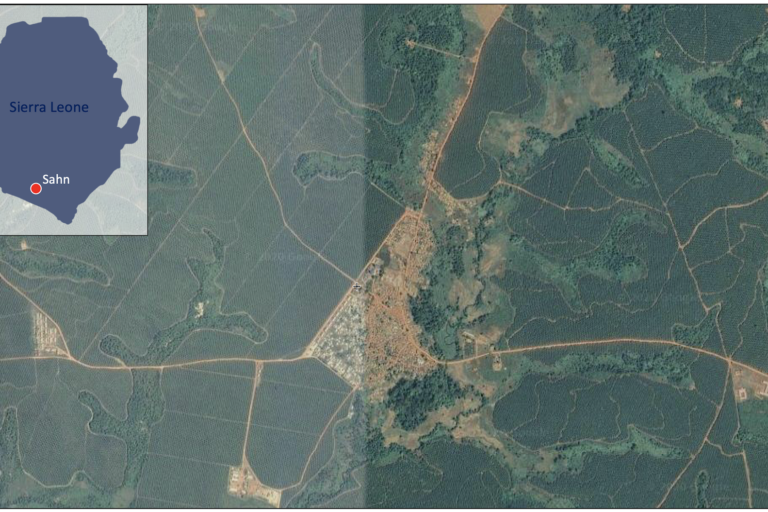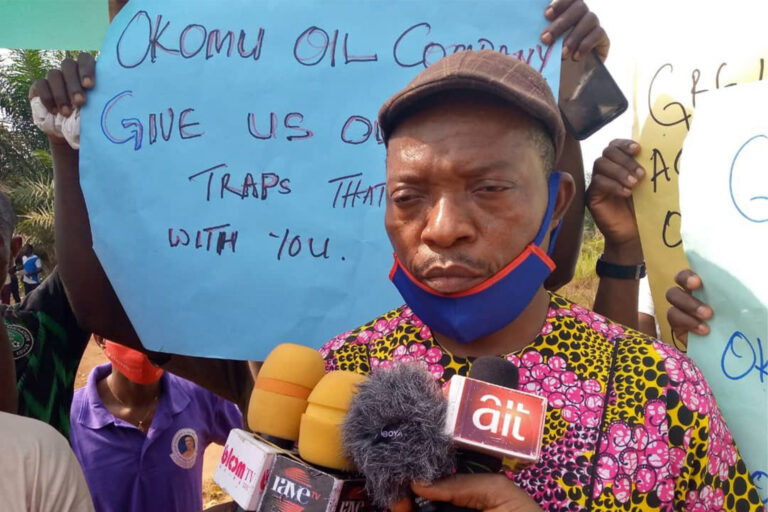Findings from a second round of investigations into allegations of human rights abuses on plantations owned by Belgian company Socfin have been published.Supply chain consultancy Earthworm Foundation found evidence of sexual violence and land conflict, following similar findings from other plantations in West and Central Africa published in December 2023.Around one plantation, in Sierra Leone, a mapping exercise may signal action to remedy some problems, but communities and their supporters elsewhere say it’s unclear how Socfin can be held to account.International NGOs point out that the findings are in conflict with Roundtable on Sustainable Palm Oil (RSPO) certifications that Socfin holds.
In 2023, Socfin hired a consultancy to investigate longstanding allegations of human rights violations and environmental damage raised by communities living around the Belgian transnational company’s oil palm and rubber plantations in Africa and Southeast Asia. Findings from a second round of investigations have now been published.
Supply chain consultancy Earthworm Foundation’s investigators visited a subsidiary in Sierra Leone, the Socfin Agricultural Company (SAC), and one of the holding group’s four Cameroonian operations, SAFACAM. They found evidence of sexual harassment, problems with concession agreements and compensation schemes, as well as numerous incidents of pollution of water sources and environmental degradation affecting nearby communities in Sierra Leone and Cameroon.
“The [SAC] report shows that Socfin does not have safeguards in place and is lacking due diligence,” said Joseph Rahall, from the Sierra Leonean advocacy group Green Scenery.
Rahall, whose organization has been a leading voice raising concerns about Socfin’s practices since the plantation was established in 2011, said he was surprised by how forthright the report was.
The investigators found pollution of rivers, lakes and lagoons in both Sierra Leone and Cameroon that they said could be linked to the company’s activities. In Sierra Leone, they also reported that the company doesn’t always apply measures to mitigate air pollution as proposed in the environmental, social and health impact assessment carried out when the plantation was set up in 2011.
Margaret Fascia was amongst those who fought to protect their land when Socfin arrived to set up a plantation in 2011. “I stood in front of the machine,” Fascia said. “‘Peep peep peep’ made the bulldozer as it came right up to my foot. I didn’t move. So they stopped there. They don’t touch my palm trees.” Image by Maja Hitij.
Earthworm investigators told Mongabay they were shocked by some of their findings. While disputes over land and lease agreements — and Socfin subsidiaries’ implementation of them — have been at the core of complaints against the company from the start, investigators have found sexual harassment and gender-based violence to be major issues at all of the plantations they have visited.
EF laid out a set of recommendations in each of its reports. In response to findings of widespread gender-based violence, the consultancy recommended strengthening reporting mechanisms and policies on Socfin’s respective plantations. However, in a recent update to their action plan for the Salala Rubber Corporation in Liberia, released after the first phase of investigations in 2023, many of the actions are either “ongoing” or “to start” and have not resulted in tangible change.
“We’ve found [evidence of sexual harassment], and they know they need to address it. A global reaction and a corporate-wide strengthening of how they handle this is a must-have,” said Charlotte Opal, the foundations’ director of memberships and partnerships.
Earthworm notably did not recommend compensation for survivors of GBV, or support for prosecution of perpetrators. Opal said EF does not have expertise on this. “Socfin is working with a local expert to advise them on their policy. Maybe compensation is part of that,” she said.
She stressed that while Earthworm has made recommendations, it will be up to Socfin to put them into action. “We don’t have any power over Socfin, but we hold them to account to advance on their actions and explain themselves when they find challenges. If they don’t make progress on these issues, we would stop working with them, as that’s our mission as a foundation.”
Meanwhile, the relationship between Socfin and local communities in West and Central Africa continues to deteriorate, with the exception of Sierra Leone. The Malen Affected Land Owners and Users Association (MALOA) has been taking part in a land mapping process that Socfin committed to in early 2023, reassessing acreages and establishing ownership of land that has been unclear since 2011.
“The fact that Socfin is doing the mapping according to the law means that they may want to comply with some aspects of the law,” Rahall said.
 Google Earth view of the Socfin Agricultural Company plantation in Sierra Leone in 2013.
Google Earth view of the Socfin Agricultural Company plantation in Sierra Leone in 2013.
MALOA was one of the few local organizations that agreed to participate in Earthworm’s investigations.
As the Earthworm Foundation was hired by Socfin, some of its critics say the paid consultants are inherently biased. Even though its investigations have confirmed most of the accusations that communities have leveled against the company, skepticism remains.
“We would have wished the recommendations to be stronger. Some things were left out,” Rahall said Rahall, referring to the company’s failure to implement an out-growers scheme for the SAC plantation, mentioned in the memorandum of understanding between the company and the Sierra Leonean government.
If some progress is being made in Sierra Leone, this is not the case in the other countries where the investor operates. In Liberia, where the publication of the final report of a five-year World Bank investigation into serious human rights violations at SRC has been delayed for more than six months. The recently leaked information of Socfin’s intention to sell their controversial subsidiary has sparked criticism from community leaders and international nongovernmental organizations.
In an open letter, they said the company is trying to avoid potential compensation payments and other actions to remedy the harmed communities as a result of the World Bank investigation.
In Cameroon, land and other issues remain unresolved. And in Nigeria, communities living around the plantation run by Socfin subsidiary Okomu Oil Palm have been facing a wave of extreme violence in recent months. Several villages have been burned down and six people have been shot, including plantation workers and villagers.
The News Agency of Nigeria quoted the local governor as saying that the violence was carried out by “terrorist organizations,” but community leader Sunday Ajele accused Okomu Oil Palm and the Nigerian government of responsibility. “The company is the instigator of this crisis. They are using our people to divide the communities,” he told Mongabay in a phone call. He claimed the latest attack was linked to company security and accused the government of protecting Okomu. “The government is not taking the villagers’ complaints seriously,” he said.
 Sunday Ajele, pictured here at a 2021 protest, has been a fierce critic of Okomu Oil Palm for more than a decade. Image courtesy Sunday Ajele.
Sunday Ajele, pictured here at a 2021 protest, has been a fierce critic of Okomu Oil Palm for more than a decade. Image courtesy Sunday Ajele.
Ajele said the investigating team interviewed him about allegations the company was responsible for violence against community members, as well as blocking access roads and polluting rivers, but he had not heard anything about the release of the report.
Earthworm told Mongabay that they expect to publish findings on Okomu Oil Palm and another Cameroonian plantation later this month, while a Cambodia investigation will be released later in the year.
While the investigations have no direct legal consequences for Socfin, the findings could lead to a review of the company’s status as a supplier of sustainable palm oil. “A lot of findings are in total contradiction with the RSPO [Roundtable on Sustainable Palm Oil] report,” said Florence Kroff from the human rights organization FIAN International.
In recent years, most of Socfin’s plantations have been certified by the RSPO. “In their report, the auditors of the RSPO certified that all criteria were met by Socfin, even regarding food security, access to land, compensation and no land conflicts. Earthworm says the opposite, so we need to see what’s next,” said Kroff, who does not expect Earthworm to push for the review of Socfin’s status as a supplier of sustainable palm oil.
Socfin did not respond to Mongabay’s request for comment, but in a public statement following the reports, the company said, “Socfin agrees with Earthworm that more needs to be done to further reduce these concerns and that some serious issues need immediate action.” The notice also said the company had already implemented what it called “corrective measures” addressing the issues.
As a Cameroon palm oil firm gets RSPO certified, it’s also found in breach
Banner image: Socfin Agricultural Company plantation, Sahn, 2012. Image by Maja Hitij.
FEEDBACK: Use this form to send a message to the author of this post. If you want to post a public comment, you can do that at the bottom of the page.
Activism, african palm oil, Agriculture, Business, Conflict, Corporate Responsibility, Corporations, Crime, Environment, Environmental Crime, environmental justice, Environmental Law, Governance, Human Rights, Indigenous Peoples, Indigenous Rights, Industrial Agriculture, Industry, Land Conflict, Land Rights, Law, Oil Palm, Palm Oil, Plantations, Protests, Rainforest Deforestation, Rainforests, Rubber, Social Conflict, Social Justice
Cameroon, Central Africa, Nigeria, West Africa
Source link : https://news.mongabay.com/2024/06/investigation-confirms-more-abuses-on-nigeria-sierra-leone-socfin-plantations/
Author :
Publish date : 2024-06-27 04:34:01
Copyright for syndicated content belongs to the linked Source.





